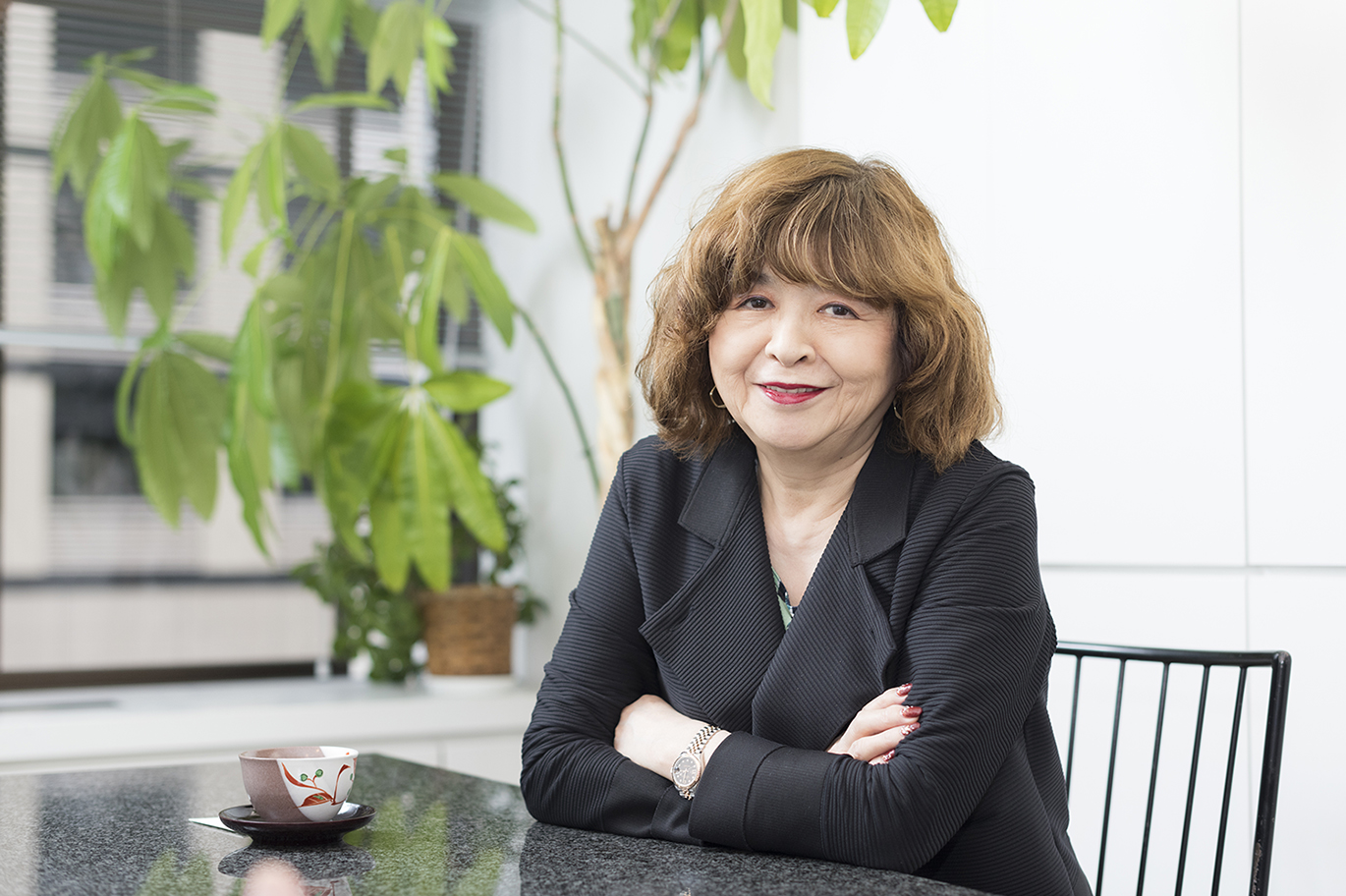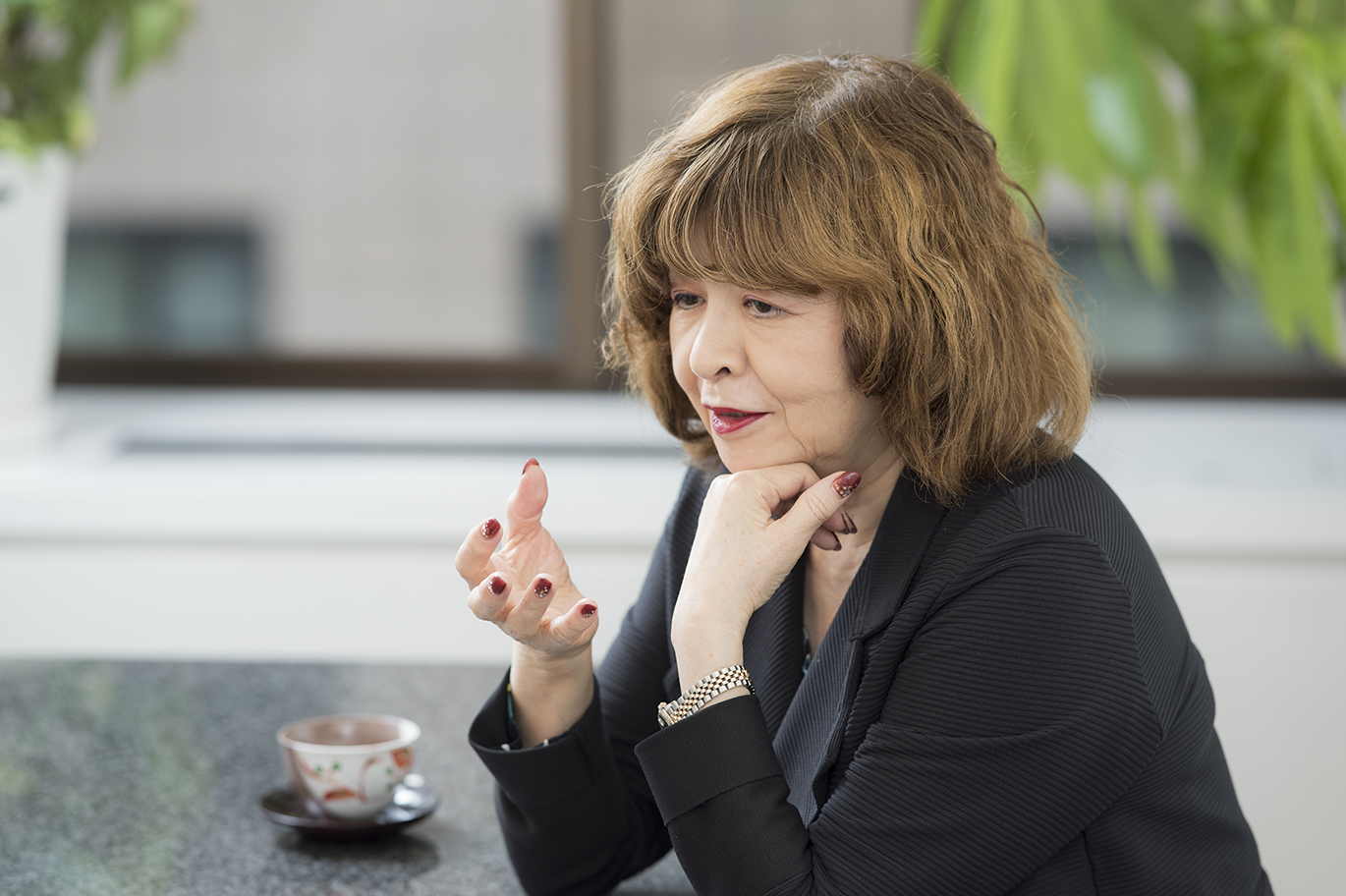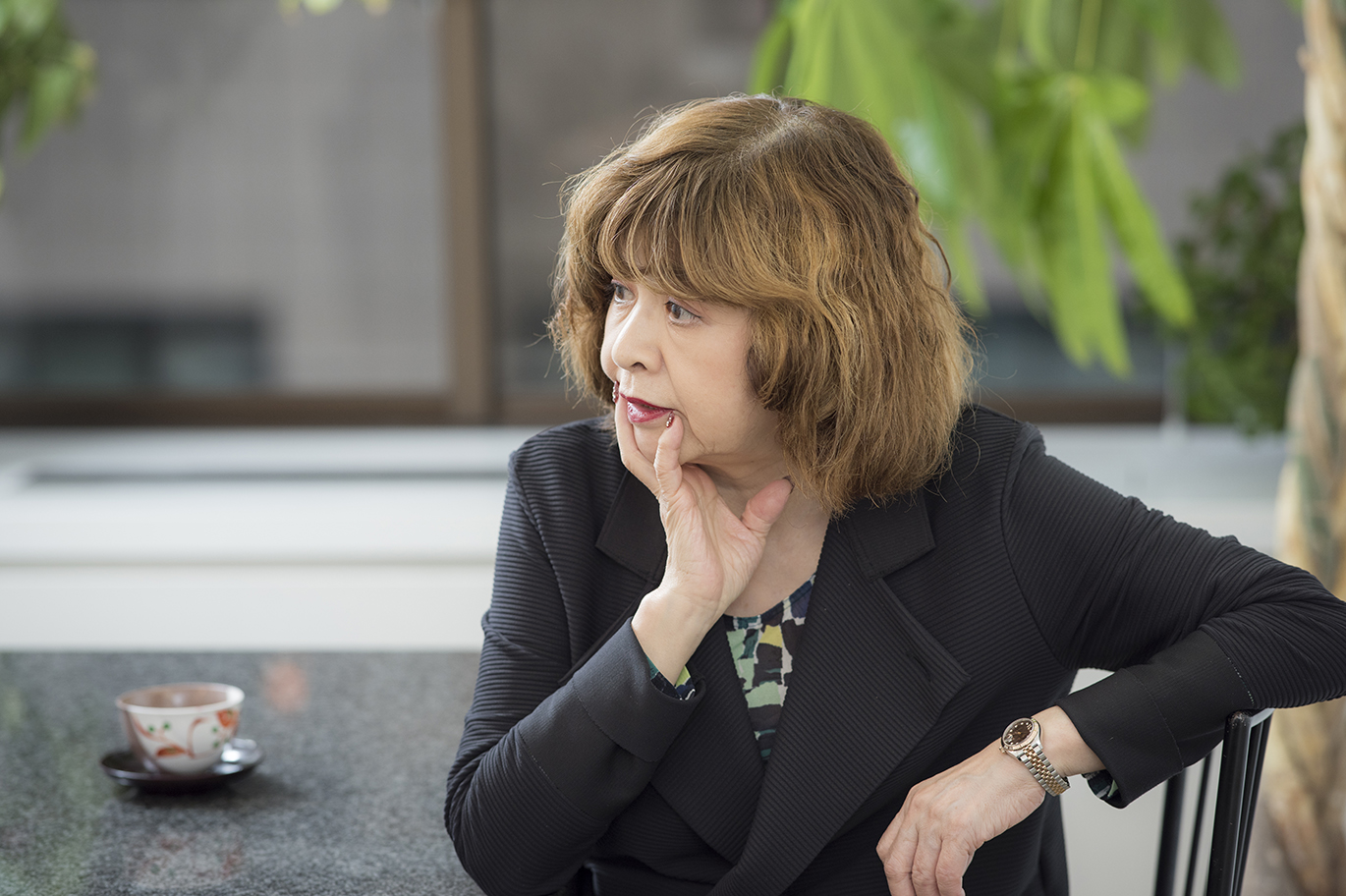"Cool Adult" columns
vol.08
Rieko Zanma
Producer
Born 21st March, 1950
The renowned producer was a master of socializing the “living”

Ms. Rieko Zanma is a renowned producer active in a variety of fields. She was the producer of “Aoi Toki”, an autobiography of the legendary singer, Momoe Yamaguchi and is the author of “Sorede Iinoka Sobauchi Otoko” which is the first serious attempt to analyze the baby boomer generation from a female perspective. In addition to publication, she has also produced and organized a number of films and cultural events.
In 2009, Ms. Zanma founded “Club WillBe” in an attempt to create a new culture for the adult. She has advocated that “adults” should become the role model for the following generation by living a rich and meaningful life and has herself been living that way.
Her mother’s way of life - “For those that are having a harder time than yourself”
―I understand that your mother, who passed away 5 years ago at the age of 99, was a civic activist that had also stood up to run for the Sendai City Council Member election before her marriage. What was she like?
Ms. Rieko Zanma My mother was the Women’s Manager at Sendai Railroad Administration Bureau, the Labor Union for the Japan National Railway, where my father was the Youth Group Manager. They both lost their jobs as a result of the Red Purge (*Note 1) that took place after the war which made our living very tough financially. Our family of 5, including my grandmother, was living together at a place that had only 2 very small rooms (each the size of only 3 tatami mats and 5 tatami mats). At night, a number of people will come to discuss about things like “capitalists” and “exploitation”. One day, my mother broke my piggy bank with my savings that I had desperately saved up from my new year gift and allowances.
―Oh no! That must have been quite a shock. What happened?
Ms. Zanma My mother was then involved with the Matsukawa Incident (*Note 2) as a member of the defense team and did not have the money to travel to Matsukawa City to help the defendant. My mother said that it was for her “to go to help the person that is suffering seriously as a result of being blamed for a crime he did not commit”. However, I could only see her as being unreasonable. Our living was very poor that we could often not afford to even pay for my school lunch fee. I wondered whether my mother had any idea how I felt when I had to go to the school on the 25th every month which is the payment date for my school lunch.
―It must have been hard for a child to understand.
Ms. Zanma My mother’s educational policy was “Yes, it may be tough for you but there are other people that are suffering even more.” “Although we haven’t paid for your school lunch for 3 months, I am of course intending to pay eventually. We just cannot pay now as your father’s work is not going well. But think about A. She hasn’t paid for her lunch for more than 6 months but is not at all servile and is acting so admirably, being cheerful all the time. She studies well and is also taking good care of her younger sister and brother. Think about how someone can be like her.” Then I have nothing more to say as A is really like that.
―Wow! Your mother certainly does not flinch. That was how you were toughened up.
Ms. Zanma My mother raised me and my younger brother with love but was always conscious of her thoughts, or to be more precise, the “society”. I respected my mother that said “It is only a matter of course for a person to work for someone that is in trouble or that is having a harder time than yourself.” I admired how she was not like any other mother. On the other hand, I also questioned what it was to act for other people. I believe that was why I felt a bit uncomfortable about “social contribution” even after I grew up.
Thoughts behind donations when she was raising her child
―While Ms. Zanma felt certain resistance against her mother’s stance to make every effort for other people that are facing difficulties, she also had the ability to watch her objectively. I understand that you realized something when you were raising your own child?
Ms. Zanma I believe it may have also been because I was raising my child as a single mother, but when my son was small, I did not want him to feel inferior about being raised by a single mother or to blame it upon his background when something did not go well. For that purpose, I created opportunities for him to know of the existence of children living under much tougher circumstances such as taking him to photo exhibitions of conflict zones and showing him a photo album of refugee camps which my photojournalist friend had sent me.
Then one day, when my son was just about to start elementary school, he said to me, “I now totally understand why this little boy is crying on his own in front of this straw hut. So can we please go to a happier photo exhibition of things like Gorenger next?”
―That is quite a natural reaction as a child!
Ms. Zanma When I was putting my son to bed, I used to show him photo albums of children that were struggling to live under famine or war and tell him that “There are so many people around the world that is suffering like this. You may sometimes find it hard to have only one parent but you are so fortunate considering that there are children around the world that lose their parents immediately after being born.” With my son’s words, I came to a shocking revelation that I was doing exactly the same thing as my mother that used to tell me “Things may be tough for you but look at A.”
―I understand that you made your son make donations as well.
Ms. Zanma When my son received money from someone for a new year’s gift or anything, I made him donate 70% of that when he was in elementary school. The percentage became 50% when he was in junior high school and 30% when he was in high school. When he was at university, I made him donated 10% as he no longer received that much money and told him it was “because there are children around the world that cannot celebrate Christmas or new year”. There is clearly no way of knowing how that would affect his human nature in the future. However, I did try to teach him how difficult it is to earn money and its significance by telling him that these money he was receiving was more of a reflection of being my son than himself.
May be he still does not get the message as if there is a chance, he would try to draw some money out of me saying things like “I wish you would give me some money for my initiative..” I think it is good enough if he were to one day suddenly remember my words after I pass away.

Interest in the invisible led to becoming a renowned producer
―You had a successful career as a magazine reporter and a skillful editor and then became a producer. What drove you to this?
Ms. Zanma I realized when I was small that I was not cut out to be a self presenter or to be the main front running player. One day, my mother took me to a musical show she managed to get tickets for by collecting boxes of toothpaste. I suspect that most people would dream to become the star girl playing in the show. As for myself, I was more interested in the structure behind the musical show that made the girl sing under the sparkling illumination. Then again, it may only have been because I knew I didn’t have the talent or a charm like this girl.
However, I remember wondering who it was that told this girl to sing this song or who it was that told her to wear these clothes. I clearly had no knowledge or things like lighting or staging but I remember also wondering things like who it was that decided on the color of the sparkling illumination.
―You were more interested in the invisible part, things that went on behind the scene.
Ms. Zanma There were many people around me then – rich people, poor people, energetic people and sick people. This woman is always smiling in front of me but why is she sometimes crying behind the house? This person appears this way but must actually be feeling lonely. This person is always angry but is there some reason behind that? I think I was always very sensitive to the feelings hidden behind the surface. The “ability to search” for the hidden good within that person that is not visible on the surface. I think that is important.
―That is indeed a quality one needs to become a producer.
Ms. Zanma I think in the end, that was all I had. Whether that be an editor or a producer, they are both people working behind the scene. As for myself, after working as an editor I became a producer before knowing it.
―“Sorede Iinoka Sobauchi Otoko (=Is that good enough, men making soba noodle?)” published in 2005 was your first step in producing a new model for the senior generation.
Ms. Zanma I am not saying that there is anything wrong with making soba noodles. It is better to do something than nothing. However, I wish to say that if you had gone as far as taking soba making lessons, why don’t you go outside and use that skill? Isn’t it better to socialize your “skill” just a bit more?

Producing a new adult culture
―After your epoch making “baby boomer generation theory”, you established “Club WillBe” to support the baby boomer generation. What is this club like?
Ms. Zanma We now have 13,000 members at our club after 12 years of operation. Every member is registered under their real name. Although there are people that say what they want to say anonymously through the internet, I believe that if one is going to voice his/her opinion, they should do that under their own name. All members have registered their real name as well as their addresses and contact details. There is no entrance or membership fees. Members only pay for their cost when they participate in various events.
We organize seminars, study groups, networking events and various tours that stimulate their intellectual curiosity. We also have the “WillBe Mixed Chorus Group” and occasional social contribution activities.
―What is your thought behind creation of the club regarding adult culture?
Ms. Zanma Currently, people are categorized as senior citizens after the age of 65. I believe this is no longer a suitable reflection of the reality. The baby boomer generation that are in their early 70s have gone through the baptism of Beatles and Bob Dylan. Fashion wise, they grew up wearing jeans and T shirts. They have also traveled domestically as well as overseas driven by words like “Throw away your books, go outside” and “The youth heads for the wilderness”. They grew up watching Nouvelle Vague films and Japanese films that were appreciated overseas such as ATG (=Japan Art Theater Guild, a film company). Although there are some people that are not as confident with their health after the age of 70, they are overall still very aspirational. There are many people that wish to contribute to the society using their skills and people that wish to continue working as long as they have the energy.
Personally, I believe that after the age of 80 should be the definition of “senior citizens” with no classification of early or late. The media such as TV as well as companies like targeting the “young age group”. However, whether that be drama or movie, good contents attract both the young and senior aged people. There are so many examples of them trying too hard to appeal to the young generation unsuccessfully resulting in losing even the senior generation that used to be there as supporters. Over the recent years, “Club WillBe” has interacted proactively with young people, naming it “Cross Generation” and listened to the talks of young people as well as collaborating with them. Young people are also keen to listen to the stories of older people with interest if they are not bragging or preaching. They listen seriously to stories of the war or how people were running around like crazy during the bubble period.
―Zanma has created a new value within the society through her work as a producer. She says influence from her mother’s way of life to “socialize one’s own life” was at the base of such work. I hope she continues to produce new cool stories for adults. Finally, can I have your word about Birthday Donation?
Ms. Zanma After a certain age, birthdays that used to be a day to be celebrated turns into a day to be grateful for being able to live to date. This is even more the case recently as there are friends that died as a result of being infected with COVID virus. Even without the virus, I have experienced many friends that had been very well till recently suddenly pass away. I am even more grateful to be living well with the support of many people.
It was when I was wondering how or to whom I should be passing this “thank you” to when I came to know about this Birthday Donation project. As I believe it is a wonderful idea, I have been telling my friends and people around me that “This is definitely the way a cool adult should spend their birthday.”
Interviewer: Yoko Takahashi, President, Japan Philanthropic Association
※Note1 During 1949~50, there were illegal and unjust layoffs of members of the Japanese Communist Party or its supporters carried out by the Japanese government and corporations at the instruction of the then occupying American arm force. It is estimated that more than 40,000 people lost their job as a result.
※Note2 A train traffic obstruction incident that happened on the Tohoku Line of the then Japan National Railway. It is listed as one of the largest false accusation cases post war.
Rieko Zanma
Born in 1950 in Sendai City. After a career as an announcer and an editor, she established a planning and production company in 1980. She has planned and organized a number of publications, films and cultural events. In 2009, she established “Club WillBe”, a network to create new culture for the adult. She is the author of books such as “Sorede Iinoka Sobauchi Otoko” (Shinchosha) and “Mo Ichido Hanawo Sakaseyo” (Chuko Shinsho Laclef) , etc.
